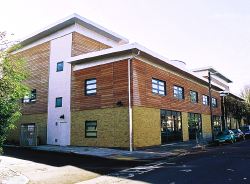Novar Trend lifts standard of control in NHS primary-care centres

Advanced control for advanced health care — Trend building management systems are to be used in a number of health-care centres being operated by GSL. This health centre is at Church Road in London’s East End.
The long-term perspective taken by critical-services-support-provider GSL for new ‘one-stop’ health centres being built under the NHS’s LIFT initiative has resulted in the specification of Novar Trend equipment to provide a standard approach to BMS. The first of these projects is at Church Road in London’s East End. This 2450 m2 building houses six GP practices, as well as cardiology, diabetic and dietetic clinics, and other services such as a dental surgery, pharmacy and optician. District nurses and health visitors will also operate out of the building. GSL will be responsible for operating some 80 of these premises that are being built in a £1 billion investment to reinvigorate England’s primary-care services. The NHS LIFT (Local Improvement Finance Trust) programme represents a new form of public-private partnership aimed at replacing or substantially upgrading thousand of sub-standard primary-care premises. The 42 LIFT companies are joint ventures between local health trusts, local authorities, Partnerships for Health and a private-sector consortium. The companies will own the buildings they develop, renting them out at agreed rates to GPs and other practitioners. The GSL approach to selecting building services is to achieve best value in terms of whole-life cost, with several preferred suppliers nominated for each type of equipment or system. GSL has specified that only Novar Trend systems will be used, and that they will be supplied directly. GSL is taking a high-tech approach to managing the new centres so as to increase efficiency and drive down costs. Novar’s Horsham bureau will provide centralised monitoring and management of the building controls and the heating and air-conditioning systems that they regulate. Alarms relating to the HAC plant can be rapidly re-transmitted to GSL’s maintenance contractor PME, which can have the facility to remotely interrogate any site using just a web browser. Trend equipment includes three networked IQ3xcites. Their duties include control and monitoring of air-handling plant, boilers, perimeter heating and domestic hot water. GSL has to guarantee availability of the building services. Space temperatures have to kept within prescribed limits, which relies heavily on the ability of the building-management systems to consistently control to close tolerances. Automatic control of HAC plant so that it runs only when necessary will eliminate the over-use of energy that is often a problem in buildings of this size which have traditionally used much more basic controls.
Related links:


